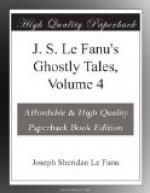“I don’t know what,” he retorted, smartly, grasping at his hat.
“You won’t be throwing up the little finger, Bobby, acushla?” she said, evading his grasp.
“Arrah, why would I, woman? there, give me my hat, will you?”
“But won’t you promise me, Bobby darlin’—won’t you, alanna?”
“Ay, ay, to be sure I will—why not?—there, give me my hat, and let me go.”
“Ay, but you’re not promisin’, Bobby, mavourneen; you’re not promisin’ all the time.”
“Well, divil carry me if I drink a drop till I come back again,” said the sexton, angrily; “will that do you? And now will you give me my hat?”
“Here it is, darlin’,” she said, “and God send you safe back.”
And with this parting blessing she closed the door upon his retreating figure, for it was now quite dark, and resumed her knitting till his return, very much relieved; for she thought he had of late been oftener tipsy than was consistent with his thorough reformation, and feared the allurements of the half dozen “publics” which he had at that time to pass on his way to the other end of the town.
They were still open, and exhaled a delicious reek of whiskey, as Bob glided wistfully by them; but he stuck his hands in his pockets and looked the other way, whistling resolutely, and filling his mind with the image of the curate and anticipations of his coming fee. Thus he steered his morality safely through these rocks of offence, and reached the curate’s lodging in safety.
He had, however, an unexpected sick call to attend, and was not at home, so that Bob Martin had to sit in the hall and amuse himself with the devil’s tattoo until his return. This, unfortunately, was very long delayed, and it must have been fully twelve o’clock when Bob Martin set out upon his homeward way. By this time the storm had gathered to a pitchy darkness, the bellowing thunder was heard among the rocks and hollows of the Dublin mountains, and the pale, blue lightning shone upon the staring fronts of the houses.
By this time, too, every door was closed; but as Bob trudged homeward, his eye mechanically sought the public-house which had once belonged to Phil Slaney. A faint light was making its way through the shutters and the glass panes over the doorway, which made a sort of dull, foggy halo about the front of the house.
As Bob’s eyes had become accustomed to the obscurity by this time, the light in question was quite sufficient to enable him to see a man in a sort of loose riding-coat seated upon a bench which, at that time, was fixed under the window of the house. He wore his hat very much over his eyes, and was smoking a long pipe. The outline of a glass and a quart bottle were also dimly traceable beside him; and a large horse saddled, but faintly discernible, was patiently awaiting his master’s leisure.
There was something odd, no doubt, in the appearance of a traveller refreshing himself at such an hour in the open street; but the sexton accounted for it easily by supposing that, on the closing of the house for the night, he had taken what remained of his refection to the place where he was now discussing it al fresco.




